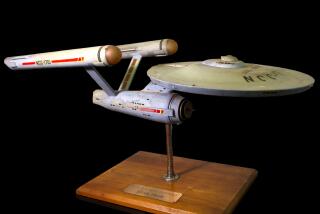Auction of Rare Fossil, Piece of Apollo 11 Draw Scrutiny
- Share via
SAN FRANCISCO — A 200-million-year-old fossil of a winged lizard was auctioned for $167,000 Sunday, a whopping bid that raised the hackles of paleontologists concerned about the commercialization of important finds.
Also sold at the Butterfields auction, held simultaneously at the firm’s San Francisco and Los Angeles facilities, was a silver handle from the command module of Apollo 11 that took Neil Armstrong and company to the moon’s orbit. That item brought $34,500 from an unnamed bidder, but National Aeronautics and Space Administration officials are investigating the sale.
The fossil, the only one of its kind, was purchased by an unidentified man who called himself a friend of the American Museum of Natural History. The fossil has been studied there for more than 30 years, and the buyer said he will return it to the museum.
The owner of the fossil, Alfred Siekfer, found it when he was 17. He is 56 now, and his failing health convinced him to sell the fossil for the cash.
Icarosaurus looks like a 7-inch-long lizard with a 10-inch wingspan and is the oldest airborne vertebrate known to scientists. The fossil proved that vertebrates attempted flight 10 million years earlier than anyone then suspected.
Mark Goodwin, a vertebrate paleontologist and principal scientist at the Museum of Paleontology in Berkeley, called the sale of the Icarosaurus a “highly unethical event that will only increase commercialization and encourage the theft of fossils from museums.”
The office of the inspector general for NASA announced earlier this month that it would investigate plans by Butterfields to sell an 18 1/2-inch-long silver EVA, or “extravehicular activity,” handle.
But by the time the auction took place, a deal had been struck.
“Because the NASA inquiry is continuing there is an additional condition of sale that should NASA decide that the item should be returned to them, we will certainly return funds to the buyer,” said Butterfields spokesman Levi Morgan.
The handle’s seller, Charles Barnes, is a former radiation safety officer at NASA’s John F. Kennedy Space Center who performed tests on the space trinket in the 1970s.
Barnes kept the handle in a safe after leaving NASA, performing periodic tests for radiation leakage for the administration.
More to Read
Sign up for Essential California
The most important California stories and recommendations in your inbox every morning.
You may occasionally receive promotional content from the Los Angeles Times.











